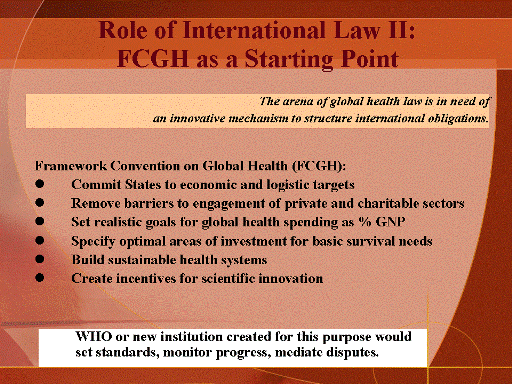| front |1 |2 |3 |4 |5 |6 |7 |8 |9 |10 |11 |12 |13 |14 |15 |16 |17 |18 |19 |20 |21 |22 |23 |24 |25 |26 |27 |28 |review |
 |
If law is to play a
constructive role, it will require an innovative way of structuring
international obligations and this, in turn, will require States to
accede to a new model. A vehicle such as a Framework Convention on
Global Health (FCGH) could be a starting point. Such a Framework
Convention would commit States to a set of targets, both economic
and logistic, and dismantle barriers to constructive engagement by
the private and charitable sectors. It would have to stimulate
creative public/private partnerships and actively engage civil
society stakeholders. A FCGH could set achievable goals for global
health spending as a proportion of GNP; define areas of cost
effective investment to meet basic survival needs; build sustainable
health systems; and create incentives for scientific innovation. The
World Health Organization (WHO) or a newly created institution could
set ongoing standards, monitor progress, and mediate disputes.
A FCGH, or similar
mechanisms would not be easy to achieve politically or provide an
ideal solution. But, at least, a Framework Convention would go to
the heart of the problem—finding creative ways to engage States, the
private sector, and civil society to find sustainable solutions to
improve prospects for a healthier and longer life for the world’s
population.
|